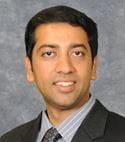Our Team


Dr. Arvind Bhimaraj is the Co – Director of the Heart Failure Research Laboratory. He has been in this position since 2016 and has taken up a leadership role in guiding the trajectory of the laboratory to promote a collaborative translational work for all the laboratory faculty members. He also presides over the weekly laboratory meeting and guides the research fellows on their work. His area of focus is anti-fibrotic mechanisms and how to promote recovery of a heart. He has developed a unique mouse model to study such mechanisms. He actively collaborates with researchers in the institute of nanotechnology and regenerative medicine with a focus to create a nano-RNA therapy to promote recovery (healing) of damaged hearts. He is also working actively to explore similar mechanisms in heart tissue (biopsy sample) from heart transplant patients to identify mechanisms of fibrosis and hypertrophy (damage) in these hearts in an effort to create a genetic test to identify these mechanisms from blood tests. He actively collaborates with researchers in the institute of informatics at the Houston Methodist Research Institute. His ultimate goal in this area is to identify mechanisms and create treatment strategies to decrease damage to a transplanted heart and hence prolong longevity in this population.




Dr. Thandavarayan A. Rajarajan received his training at Niigata University of Applied Life Sciences in Niigata, Japan, where he earned a PhD in pharmaceutical science. His research identified that the development of diabetic cardiomyopathy is accelerated after disruption of 14-3-3 protein function, in part through enhancement of the Ask-1-MAPK-NF-kB signaling pathways. Dr. Thandavarayan’s PhD training was followed by a post-doctoral fellowship at the same university. He studied the effect of different antioxidants in accelerated ageing induced cardiac remodeling and determined that the inhibition of oxidative stress through inducing antioxidant enzymes by a small molecule (developed in his lab) attenuated the pathological cardiac remodeling and improvement of heart failure in accelerated ageing. Dr. Thandavarayan came to Houston Methodist Research Institute in 2014 and studied the role of Sirtuin 6 (SIRT6), a stress responsive protein deacetylase and mono-ADP ribosyltransferase, in macrophage polarization mediated regeneration in diabetic hearts and generated a unique in vitro system to study the endothelial function using Hutchinson-Gilford Progeria Syndrome (HGPS) patient-specific iPSC. These studies provide an in vitro iPSC-based model to study the pathobiology of premature vascular aging. In addition to his research, he has collaborated on several other projects. In one collaborative project, they identified that diabetes impairs efferocytosis of apoptotic cardiomyocyte, and that strategies to enhance efferocytosis might attenuate diabetes-induced impairment in inflammation resolution and cardiac repair after injury. In another collaborative study, they identified that heart failure increased miR-377 expression in the myocardium, which is detrimental to stem cell function, and transplantation of miR-377 knockdown hCD34(+) cells into ischemic myocardium promoted their angiogenic ability, attenuating left ventricular remodeling and cardiac fibrosis. In line of the interest, his research efforts are aimed at elucidating how alternative polyadenylation contributes to the development of heart failure (both right and left) using human heart tissue samples from the Houston Methodist Hospital bio-bank and sophisticated experimental models of disease. Dr. Thandavarayan’s received several awards; research funding’s including American Heart Associations and has over 95 scientific publications in international journals, including original research articles and reviews.
